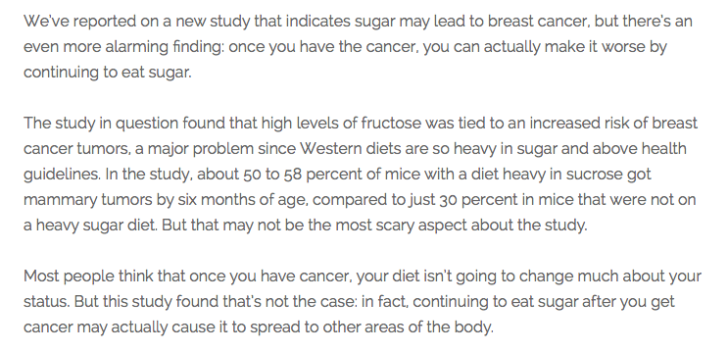Not science. Stupidity.
Don’t know what happened here but: (1) Mice are not little people; (2) Laboratory mice are bred to be cancer time-bombs; and (3) if sugar caused or worsened cancer, someone would likely have noticed long ago.
MorningTicker.com reports:

A PET scan reveals where the cancer cells are. It is based on a glucose solution. The study is absolutely correct. It should have been noticed long ago? Only, if you believe medicine taught at the university is science. Evidently it is not. Not the study is flawed, our society (medicine) is.
The mice or rat breeds selected for these experiments are very prone to cancer, much more so than other breeds. The idea is to find “sensitivity” to any given agent.
How about this: “continuing to breathe after you get cancer contributes to the spread of the disease throughout your body.”
mice are little critters, how much sugar where they feeding them,
24×7 will kill the hell out of anything.
Sigh. Everything causes cancer in white mice. I learned/decided that a long time ago. That, and cancer always seems to result from repeated, sustained outrages to various parts of the body intersecting with a compromised or inherited crappy immune systems. That’s why the elderly are more prone to cancer overall.
(Has anybody ever noticed that Ashkenazi Jews seemingly are forever dying from cancer? For example, both Siskel and Ebert both got it, and I don’t think it was the popcorn that did it. Like inbreeding in poodles, self restricted/self imposed intra-group marriage has resulted in a profoundly unhealthy sub-population in my opinion. )
All that said, I do have to disagree with you inasmuch as cancer does indeed *love* sugar, and it sure as hell would make it spread simply by feeding the hell out of it. An analogy would be that sugar is like gasoline: it doesn’t cause a fire, but it sure as hell makes it spread and burn wonderfully.
So these people are mostly wrong, but they are also partially very much correct.
Just a thought.
VicB3